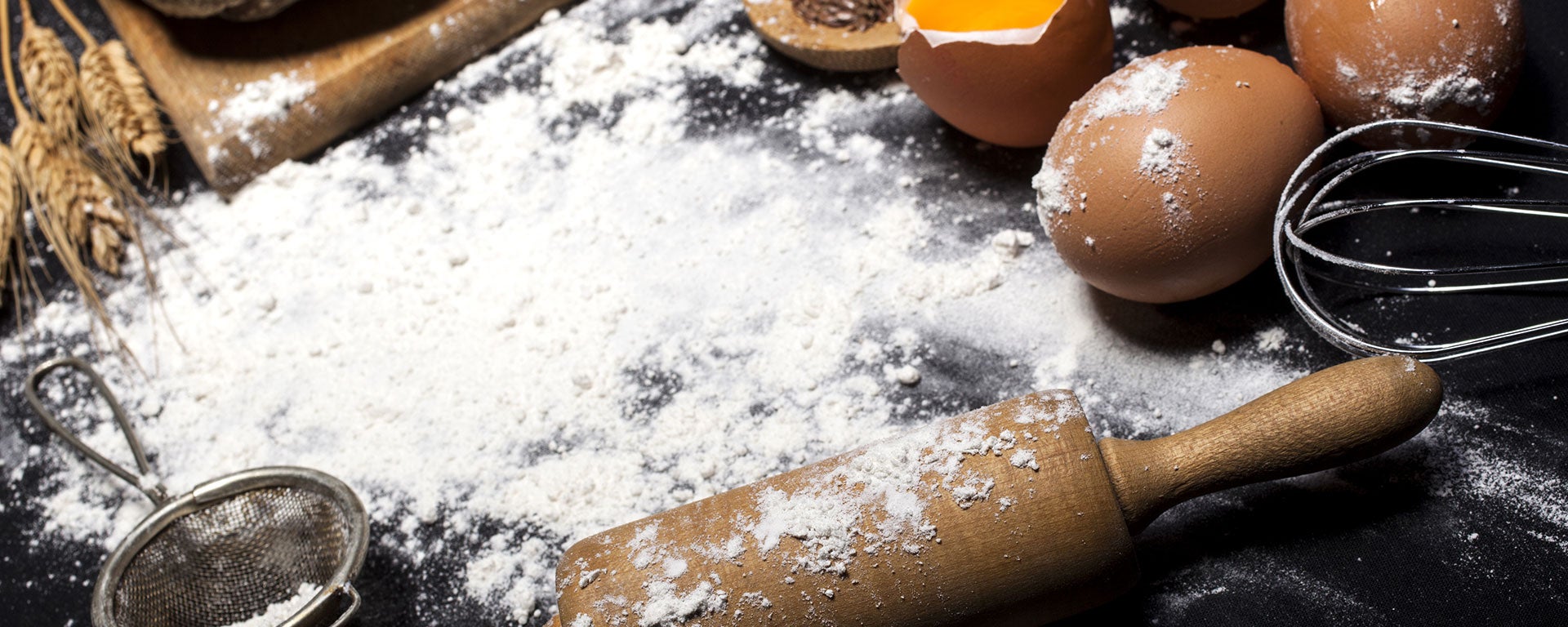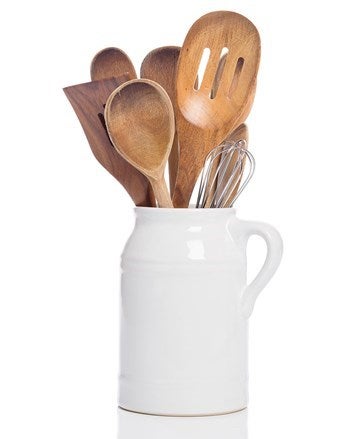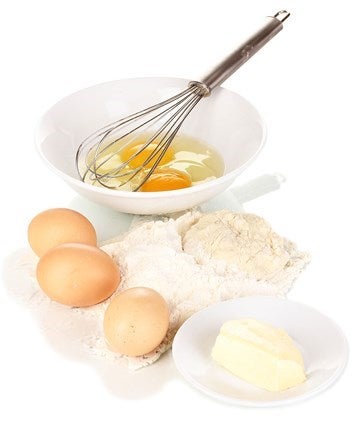Store Cupboard Essentials
Storage
Discover all the baking essentials you need to whip up something delicious at any time.
Equipment

Bowls – A variety of different size bowls are useful to have when baking. We recommend glass bowls like Pyrex as these are microwaveable and can be used as a Bain Marie when melting chocolate.
Wooden spoon – An essential baking tool for mixing together ingredients as it does not transfer heat or scratch your bowls.
Whisk – Use to mix together and aerate ingredients such as egg whites when making meringue.
Spatula – These are great to use to smooth down cake batters before baking and also capturing every last drop of cake mixture for your mixing bowl.
Sieve – This can be used to pass ingredients through retaining any unwanted particles such as fruit pips and seeds. Sifting flour will help make your cake light and fluffy. You can also use this to sprinkle icing sugar when decorating cakes.
Palette knife – A good baking tool to use to achieve a smooth finish when decorating your cakes with butter cream. It can also be used to gently lift your baked pastries and biscuits from their baking sheet.
Sharp knife – A sharp edge will create a clean and neat finish when scoring the top of your bread dough and trimming any remaining ready to roll fondant from the edges of your cake.
Baking tins – muffin/cupcake/round/square/tray bake/loaf – It is important that you use the correct size tin as specified in the recipe otherwise this could result in a messy over spill in your oven or a very thin cake. We recommend that you invest in good quality to tins to prevent your bakes from sticking.
Foil – Handy and heat resistant, you can revive old loaves by wrapping in tin foil and warming in the oven for five minutes. It is also useful to cover and protect cakes.
Baking paper – Line your baking tins with baking paper to avoid any sticking when removing your cakes. This can also be used to create a piping bag for decorative piping on your cakes.
Cling film – Use this to wrap up biscuit dough and place in the fridge to rest before baking. You can also double wrap cakes and bread in cling film when freezing.
Scissors – These will help you open your baking ingredients. Snipping bread rolls with scissors can also turn and ordinary roll into a creative hedgehog or wheat sheaves that will impress your friends and family.
Hand held mixer/ food mixer – A fast and energy saving way to mix ingredients together. Great for whisking egg whites to a stiff peak or creating light and fluffy buttercream.
Pastry brush – This can be used to create a sheen on top of pastries and bread. It can be also used to apply apricot glaze to the top of cakes prior to covering with marzipan.
Rolling pin– wooden / white – These can come in a range of sizes. Smaller rolling pins are a perfect size for children to use when baking. Larger rolling pins will help you evenly roll out your dough/icing to the required thickness. Acrylic non stick rolling pins are ideal when rolling our sugar paste.
Cutters – for biscuits & tarts – Usually circular cutters, these should be used with the sharp edge downwards. Be care not to twist the cutter when making scones to ensure a higher rise.
Cutters – for Ready to Roll icing – These will come in a variety of designs, you can let your creativity run wild. To help achieve a realistic 3D effect with your flower use a foam pad to cut out your floral shapes.
Measuring Jug – This is used to measure out liquid ingredients and is often provided in heat resistant glass or plastic for example Pyrex measuring jug. Make sure that you following recipe measurements accurately to achieve your best baking.
Paper cases – There are two types of paper cases, cupcake and muffin cases. Muffin cases tend to be deeper. We recommend that you buy the best quality cases that you can afford as we find that cheaper cases tend to peel away from the cakes. Other alternatives are tin foil and silicone cupcake/muffin cases. Using silver cases can also extend the life of your cupcakes as they can lock in the freshness.
Measuring spoons – You can often purchase a selection of different sizes fastened together for ease of use. These are more accurate than using everyday cutlery to measure quantities. Some recipes call for a levelled tsp/tbsp, scoop out your ingredient and using your finger brush along the top to remove any excess.
Scales – There are two common types of scales; traditional kitchen scale and digital scales. We find digital scales to be more accurate, however, remember to check your battery level before beginning a big bake.
Large metal spoon – Sometimes recipes call for a large metal spoon to be used. This is because metal spoons are thinner than wooden spoons and cut through the batter easier keeping the mixture airy and light.
Baking sheets – We recommend purchasing non-stick baking sheets for ease of use. Try not to over fill your baking sheets and allow your baked items room to grow in the oven.
Cooling rack – After baking it is important that you allow your baked goods to thoroughly cool before decorating. Cooling racks allow the air to naturally cool down your baking.
Apron – Baking can sometimes become a messy job, an apron will prevent your clothes from becoming messy.
Ingredients

Self raising and plain flour – Self raising flour contains a raising agent so for recipes such as a Victoria sponge no extra baking soda or baking powder is need (unless stated in the recipe). If the recipe calls for plain flour, you will often need a baking agent. We recommend using Allinson's.
Bread flour – we recommend using Allinson's Strong White Bread flour as it has a high proportion of gluten (protein) which gives the bread structure. Extra strong bread flour contains a higher level of gluten and will give your loaf a fantastic rise.
Unsalted butter – Unsalted butter is often recommended in a recipe so that you can control the levels of salt used in your recipe. Low-fat spreads do not often work as a replacement for butter, margarine or shortening as they contain less fat and higher water quantities and as a result do not bake as well.
Eggs – The average weight of a medium egg, when removed from its shell, weighs around 50g. Many sponge cakes and fruit cakes are made with equal weight of butter, sugar, flour and eggs. For best results, crack the eggs into a bowl weigh the egg, then add the same weight of the other ingredients. Always use the correct size egg that is detailed in the recipe. We recommend using Happy Eggs, Free range eggs.
Milk – If you love milk but are concerned about the fat content, consider swapping to skimmed UHT milk, like JUST MILK. Many people find skimmed UHT creamier than their normal milk so swap down a fat level. If you’re used to semi-skimmed you may find skimmed JUST MILK is just as creamy and tastes exactly the same.
Unrefined sugar – Unrefined sugar ensures the best taste, colour and aroma in your baking. We recommend using Billington’s as it is the finest unrefined sugar. The secret of natural, unrefined sugar is that it locks in, rather than refines out, the natural molasses of the sugar cane.
Baking powder – Baking powder is used to give lightness to baked recipes such as scones, cakes, pastries and sometimes batters. It is a mixture of acidic cream of tartar and mild alkaline, bicarbonate of soda. Most baking powders have a dual action. When it comes into contact with liquid it produces carbon dioxide bubbles that help aerate the mixture, then a second burst of gas bubbles are created when the mixture is heated in the oven.
Cocoa powder – You can use drinking chocolate powder as long as it doesn’t have any extra added sugar.
Chocolate – You can use chocolate instead of cocoa powder in your baking to give you a richer taste. Chocolate icing is best made with real chocolate. We recommend using Silver Spoon Create chocolate delivering quality and reliability for all your baking needs, from a name you can trust.
Chocolate chips – You can add extra flavour to your baking by adding chocolate chips. We recommend using Silver Spoon Create chocolate chips.
Vanilla extract – A small amount of pure flavour extract adds a boost to your dish without having to take the time to chop, zest or juice–let alone find the more exotic ingredients. Make sure you look for vanilla extract rather than of essence for the best results in your baking. We recommend using Nielsen-Massey Vanilla extract.
Food colouring – make your baking stand out with a splash of colour.
Vegetable oil – this is used in bread making and cakes such as carrot cake helping keep the cake moist with a soft texture.
Ground almonds – to add extra flavour to your baking either as an ingredient or as a decoration.
Cherries – again to add extra flavour or decoration to your baking. We recommend using Billington’s glace cherries to bring a natural colour to your baking.
Dried fruit – to add flavour and texture to your baking.
Spices, e.g. ginger, cinnamon, etc – for creating a twist to your baking.
Jam – this is typically used for a filling in recipes such a Victoria sponge and jam tarts, but you can use it as a decoration as well.
Cream – Cream can make your baking richer in taste and can also be used for making icing.
Icing sugar – This is used to create frosting for your baking, or you can sprinkle a little over the top as a finish on the decoration. We recommend using Billington's Golden Icing sugar for a beautiful golden colour and caramel flavour. Silver Spoon Icing Sugar is great for a whiter dusting on cakes and pastries.
Ready to Roll icing – Ready to Roll Icing is also known as Sugar Paste Icing and is most commonly used to cover special celebration cakes for Christmas, Weddings and Birthdays. We recommend Silver Spoon Create white Ready to Roll icing and some colours for choice
Marzipan – is normally used to cover fruit cakes such as Christmas cakes, but it can also be used to create decorations for your baking. We recommend Silver Spoon Create finest quality Marzipan.
Sprinkle decorations – These are great to give you that extra finishing touch on your baking.